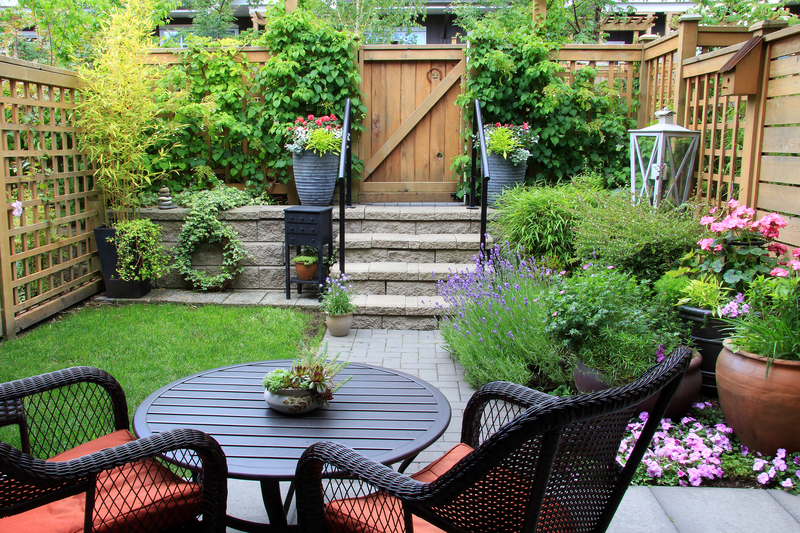Craft Nutrient-Dense Soil from the Mundane Organic Waste
Posted on 18/08/2025
Unlocking the Secret to Crafting Nutrient-Dense Soil from Mundane Organic Waste
Did you know that kitchen scraps and garden trimmings have hidden potential to dramatically boost your soil's fertility? Discover how you can craft nutrient-dense soil from mundane organic waste right at home, minimizing landfill contributions and maximizing plant vitality.

Why Transform Organic Waste into Nutrient-Dense Soil?
Every day, households and businesses generate tons of organic waste, including fruit peels, coffee grounds, egg shells, and grass clippings. Rather than tossing these riches into the trash, you can harness their nourishing power to create a thriving soil ecosystem. Recycling organic matter doesn't just prevent landfill overload--it builds biologically active, nutrient-rich ground for your plants to flourish.
- Reduce landfill dependence--Organic waste makes up over 30% of what we discard, but it needn't go to waste.
- Enhance plant nutrition--Homemade compost is rich in the macro and micronutrients essential for robust growth.
- Save money--Less need for store-bought fertilizers and soil amendments.
- Encourage biodiversity--A vibrant microbial community supports healthy, resistant plants.
Understanding the Building Blocks of Nutrient-Dense Soil
What turns inert earth into living, fertile soil rich in nutrients? The magic lies in a balanced combination of:
- Organic matter--Decaying plant and animal remains, responsible for much of soil's energy and fertility.
- Minerals--Sand, silt, and clay, determining texture and natural nutrient supplies.
- Soil life--Earthworms, insects, fungi, and bacteria, which break down waste into plant-available forms.
To craft nutrient-dense soil, you need to infuse organic waste into the earth and foster a thriving community of decomposers.
Types of Organic Waste You Can Recycle into Fertile Soil
Almost all organic waste has value for your soil-building efforts. Here are some common items you can transform:
- Vegetable and fruit scraps--Potato peels, carrot tops, apple cores, citrus rinds (in moderation).
- Coffee grounds and filters--Add nitrogen and improve soil structure.
- Egg shells--A slow-release source of calcium.
- Tea bags and loose tea leaves--Boosts organic content and attracts worms.
- Yard waste--Grass clippings, leaves, small branches, and even sawdust (untreated).
- Paper and cardboard--Shredded, uncoated paper and boxes are carbon-rich brown material.
- Animal manure--From herbivores such as rabbits, horses, and chickens (avoid dog and cat waste).
Never add meat, dairy, oily food, or pet waste--these attract pests and pathogens.
Step-by-Step Guide: Turning Mundane Organic Waste into Nutrient-Rich Soil
There are several proven techniques for converting kitchen and garden waste into humus-rich, productive soil:
1. Traditional Composting
-
Select Your Site and Bin:
- Choose a shaded, well-drained spot for your compost heap or bin.
- Ready-made bins, tumblers, or simple DIY wire enclosures work well.
-
Balance Greens and Browns:
- Greens are nitrogen-rich, like food scraps, coffee grounds, and fresh grass clippings.
- Browns are carbon-rich, such as dried leaves, twigs, shredded cardboard, and paper.
- Aim for a 2:1 or 3:1 ratio of browns to greens for balanced decomposition.
-
Chop and Layer:
- Cut or shred larger pieces for faster breakdown.
- Alternate layers of greens and browns, keeping the pile moist but not soggy.
-
Turn and Monitor:
- Mix the pile every 1-2 weeks to boost oxygen, distribute heat, and speed up decomposition.
- Compost is ready when it's dark, crumbly, and earthy-smelling--usually in 2-6 months.
2. Vermicomposting: Creating Soil with Worms
Vermicomposting uses red wiggler worms (Eisenia fetida) to accelerate the breakdown of organic waste, producing worm castings known as black gold.
- Set up a worm bin--Plastic totes or wooden boxes with drainage holes work best.
- Provide bedding--Use moistened shredded paper, leaves, or coconut coir.
- Add worms and food scraps--Avoid meat, dairy, or spicy foods.
- Harvest castings every 2-3 months to blend into your garden beds or potting mixes.
Worm castings are teeming with beneficial microbes and readily available nutrients, making them ideal for enriching homemade soil.
3. Bokashi: Fermenting Kitchen Waste for Soil Amendment
Bokashi composting is an anaerobic method using special inoculants (often wheat bran infused with beneficial microbes) to ferment food scraps, including some meat and dairy.
- Layer your kitchen waste with bokashi bran in an airtight bucket.
- Drain liquid frequently and, after two weeks, bury the fermented waste in your garden soil.
- The material breaks down quickly, minimizing odors and providing powerful nutrients for your soil.
4. Leaf Mold: Harnessing Yard Waste for Premium Soil Structure
Leaf mold is simply decomposed leaves. Collected in a wire bin or pile, leaves break down over 6-12 months, creating a lightweight, water-retentive soil amendment rich in beneficial fungi. Blend it with compost to boost both organic matter and biological activity.
How to Use Homemade Nutrient-Dense Soil in Your Garden
Once your compost, worm castings, or leaf mold are fully matured, they're ready to upgrade your soil:
- Mix into garden beds--Blend 1-4 inches of compost into existing garden soil before planting.
- Top-dress lawns--Apply a thin layer of finished compost and gently rake it in.
- Feed container plants--Mix worm castings or compost into potting soil for long-lasting nutrition.
- Side-dress existing crops--Apply around established plants to feed through the growing season.
- Make compost tea--Soak mature compost in water for a few days, then use the strained liquid to water plants for a gentle nutrition boost.
Boosting the Nutrient Profile: Enhancements and Additives
If you want to supercharge your homemade soil even further, consider adding:
- Rock dust (basalt, granite)--Provides trace minerals for robust plant growth.
- Wood ash--Adds potassium and raises soil pH (use sparingly).
- Biochar--Increases soil carbon, holds nutrients, supports microbial life.
- Green manure crops--Grow cover crops like clover or vetch, then turn them into the soil for a nitrogen boost.
- Composted animal manure--Enhances nitrogen, phosphorus, and beneficial organisms.
Common Pitfalls When Turning Organic Waste into Nutrient-Dense Soil
While the process is simple, a few mistakes can slow decomposition or create problems. Avoid these common errors:
- Improper balance of greens and browns--Too much "green" leads to smelly, soggy compost; too much "brown" slows the process.
- Compost that's too dry or too wet--Aim for the moisture level of a wrung-out sponge.
- Adding problematic materials--Oily foods, meat, dairy, pet feces, or diseased plants can introduce pests and pathogens.
- Neglecting to turn compost--Lack of oxygen stalls microbial activity and can create foul odors.
- Not shredding large pieces--Whole branches or big chunks decompose much more slowly.
FAQ: Craft Nutrient-Dense Soil from Mundane Organic Waste
How long does it take to craft nutrient-dense soil from kitchen and garden waste?
Depending on your method, it can take anywhere from 2 months (hot compost) to 12 months (leaf mold). Vermicomposting usually finishes in 2-3 months, while bokashi requires just a few weeks before burying the material.
What if my compost pile smells bad?
Strong, unpleasant odors indicate an imbalance--usually excess green (nitrogen) material or too much water. Mix in more dry, brown material (leaves, cardboard), and aerate the pile to restore microbial balance.
Can I craft nutrient-rich soil indoors?
Yes! Vermicomposting or bokashi are perfect for apartments or those without outdoor space. Small-scale indoor composters minimize mess and odors while supplying nutrient-dense amendments for houseplants or balcony gardens.
What nutrients does homemade compost add to soil?
Quality compost adds an array of essential nutrients--nitrogen, phosphorus, potassium, calcium, magnesium, and trace minerals--plus vast populations of beneficial microbes that help plants access those nutrients.

Environmental Benefits: Why Home Soil-Building Matters
→ Reduces landfill waste: Organic matter in dumps produces methane, a powerful greenhouse gas. Composting prevents this pollution.
→ Improves soil health: Every handful of compost adds life, structure, and resilience to your ground, enabling plants to thrive with fewer chemical inputs.
→ Supports pollinators and wildlife: Healthy, living soil supports a biodiverse food web, from microbes to insects to birds.
→ Conserves water: Soil high in organic matter retains moisture more efficiently, lowering irrigation needs.
Conclusion: Every Household Can Craft Nutrient-Dense Soil from Everyday Organic Waste
Transforming kitchen scraps and yard trimmings into fertile nutrient-dense soil is incredibly rewarding--and easier than you might think. By harnessing the simple science of composting, vermiculture, bokashi, or leaf mold, anyone can close the loop between waste and abundance. Start small, stay consistent, and soon you'll be enjoying lush gardens, thriving houseplants, and the satisfaction of knowing you've turned "trash" into a treasure for the earth.
Ready to craft your own soil from mundane organic waste? Begin with what you have, experiment with different composting methods, and watch your plants--and your environmental impact--grow!
Want to learn more about nurturing healthy gardens and sustainable living? Bookmark this page for ongoing tips, or share your own soil-building stories in the comments below!
Latest Posts
Turning Soil into a Climate Change Ally with Gardening
Gardening Made Easy: Dive into the World of Containers
Step-by-Step Guide to Building the Best Garden Seating Areas

